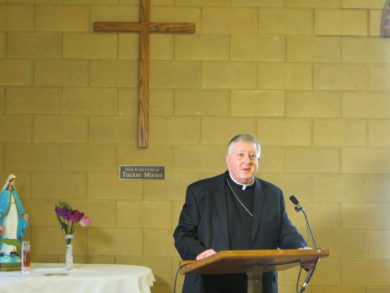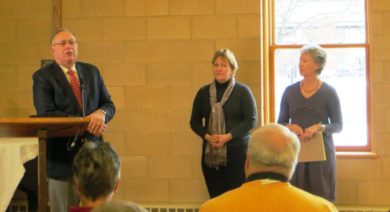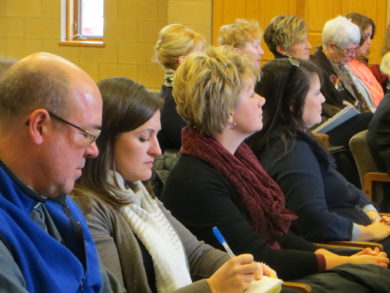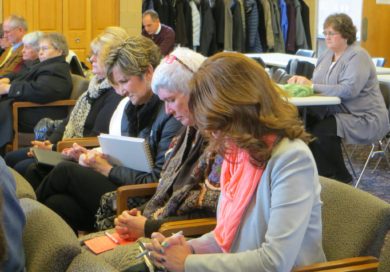January 23, 2018
Bishop Rozanski announces upcoming review of Catholic elementary schools
REGIONAL
Story and photos by Rebecca Drake

Springfield Bishop Mitchell Rozanski begins a Jan. 16 meeting of pastors and school principals at the Bishop Marshall Center in Springfield.
SPRINGFIELD – The question is how to sustain and strengthen Catholic elementary schools in the Springfield Diocese.
Springfield Bishop Mitchell Rozanski hopes to find some answers through a review of the local Catholic schools, which he announced at a press event held on Jan. 23 at St. Joan of Arc School in Chicopee.
“Here in western Massachusetts one need not look far to find a Catholic school alum who is a leader in their community,” Bishop Rozanski said at the press conference. “We have historically been successful in education because we focus on the whole person, providing a strong spiritual and academic foundation, one meant to last a lifetime.”

Coordinating the review of the Catholic elementary schools will be (left to right) Paul Gagliarducci, head of the committee working on the creation and construction of the new Pope Francis High School in Springfield; Ellen Dziura, director of special projects for the new Pope Francis High School; and Amy Gelinas, who was principal of the former St. Joseph Central High School in Pittsfield.
“You will find in our 2,600 students and 240 faculty and staff, schools which are dedicated to excellence, all within a nurturing and caring environment,” said the bishop.
“And yet we know, despite our great legacy – many of our schools face great challenges. And sadly some have not been able to continue,” he said at the press conference. “It was a problem I knew of when serving in Baltimore and one which I also found upon my arrival here in western Massachusetts.
“In so many Catholic dioceses, despite the tremendous support received by parish communities like here at St Rose, shifting demographics and ever increasing financial challenges represent a dark cloud over our future,” he continued. “Rather than sit still and wait for those clouds to arrive, I think it best to undertake actions now which will help preserve Catholic education for future generations. With that in mind I have assembled a team which in the coming months will undertake a comprehensive review of our Catholic elementary schools, to see how we might strengthen and preserve them.”
Coordinating the review will be Paul Gagliarducci, head of the committee working on the creation and construction of the new Pope Francis High School in Springfield; Amy Gelinas, who was principal of the former St. Joseph Central High School in Pittsfield; and Ellen Dziura, director of special projects for the new Pope Francis High School.
Meeting with principals and pastors at the Bishop Marshall Center on Jan. 16, Bishop Rozanski said he is focused on “bringing faith to the next generations” and told those gathered he wants their input and insights as the diocese embarks upon a comprehensive examination of the schools.
“My vision is to look at all schools,” the bishop said, to determine discrepancies in curriculum, teacher salaries and tuition. He introduced the three coordinators of the upcoming study, who also addressed those gathered in the Bishop Marshall Center.
Gagliarducci noted that the review will look at Catholic schools around the country, many of which, he said, “have taken a deep and serious look at schools” to create models that could sustain the schools.

Father Brian McGrath (left), pastor of Mary Mother of the Church Parish in Lee, and other attendees at the Jan. 16 meeting of pastors and principals take notes and listen to presenters.
Gelinas said the review will involve researching other school districts in socially and economically depressed areas, looking at curricula, buildings, marketing and technology. She said the study also will seek input from local school families to see “what kind of education people want.”
Gagliarducci cited examples of Catholic school districts that “regrouped” or joined schools together under a new name, while Gelinas mentioned broad curriculum restructuring in some schools, such as viewing students as business owners and connecting a school with a local museum.
In a Jan. 23 interview with Catholic Communications, Bishop Rozanski said modern Catholic schools are facing challenges wrought by demographic and economic changes over the last century.
“Our Catholic Schools system in this country was really started by the immigrants and what Catholic schools did for so many generations was to take those children of immigrants and mainstream them into American life,” the bishop said. “And they did a wonderful job. We relied heavily on our sisters who taught in the schools, who gave of themselves so that our children could learn.
“Today it’s different,” he continued. “We don’t have the sisters to teach in the schools. We have the very dedicated lay teachers and lay administrators, but also we know that we have to pay them a just wage.”
But, Bishop Rozanksi said, the need for Catholic schools is just a strong as it was when the first immigrants arrived.
“First of all, our schools are really an extension of the family and so what our parents are trying to do and raise their children, we support in our Catholic schools,” he said. He added that the quality of education offered by the Catholic schools is enhanced by “the gift of faith that goes along with it.”
“So, we really do integrate in our Catholic schools all that our children are learning in the perspective, the prism, of faith,” Bishop Rozanski said. And when a student views the world in the light of faith, he said, “And then the child, in turn, takes in that faith and can become a witness to the world when they graduate from our school.”

Participants in the Jan. 16 meeting at the Bishop Marshall Center pray as the meeting closes.
Asked how local Catholics can contribute to the sustenance of their schools, he said the first step is prayer.
“We need a solid foundation in our family lives of prayer, of Mass attendance, and that is really the beginning of education. So, we say in the church that the first educators of our children are the parents,” he said. “So that’s really the basis of what starts a good foundation for Catholic education.”
“Then we take that in our schools and we build upon it,” he said, “the prayer, the ability to have community service, to serve others, the way that we treat each other with respect in Catholic schools.”
Bishop Rozanski expressed hope for the future of the Catholic elementary schools.
“We need to really work together. So it is our effort among pastoral leaders and parishes, parents, grandparents, working together so that we can bring the faith to our children, and they can have a base on which to build their lives,” he said. “And that base is Jesus Christ, who is the foundation of the faith.”
The next step for Catholic school principals will be a Feb. 8 meeting with Gelinas, who said there also will be surveys of parents.
Gagliarducci said he hopes to present some information to the bishop before a year has passed, and among those at the Jan. 23 gathering, some pastors and principals stressed the urgency of addressing the issue of funding the schools as soon as possible.


 Facebook
Facebook Youtube
Youtube
